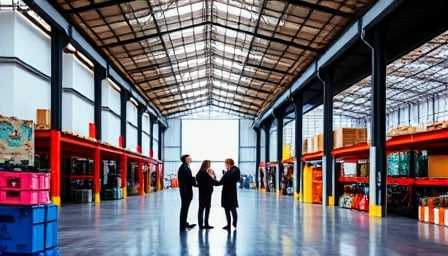Loblaw Companies Limited Accelerates Logistics Automation and Strengthens Shareholder Returns
Loblaw Companies Limited, Canada’s largest retail and wholesale food distributor, has confirmed a series of moves that underscore its dual focus on operational modernization and shareholder value creation. The company’s stock has held near its 52‑week high, a testament to investor confidence in its strategic direction.
Autonomous Freight Deployment: A Landmark North American Rollout
Loblaw’s multi‑year partnership with Gatik represents the most ambitious autonomous truck program in North America to date. The initial tranche of 20 autonomous trucks will enter service by the end of 2025, followed by an additional 30 units in 2026. The deployment is confined to the Greater Toronto Area distribution network, where high traffic density and a mature logistics infrastructure make the environment conducive to autonomous operations.
From a broader industry perspective, the move aligns with a growing trend among major retailers—e.g., Walmart, Amazon, and Carrefour—who are exploring autonomous freight to reduce labor costs, increase delivery frequency, and mitigate the impact of driver shortages. By integrating autonomous trucks early, Loblaw is positioning itself as a technology leader in the Canadian grocery sector, potentially setting a benchmark for other mid‑cap retailers.
Impact on Omnichannel Fulfilment
The autonomous fleet is expected to streamline last‑mile and middle‑mile deliveries, feeding directly into Loblaw’s omnichannel strategy. As consumers shift toward “click‑and‑collect” and same‑day delivery, the reliability and responsiveness of the supply chain become critical competitive differentiators. The automation of freight routes will reduce transit times, lower inventory carrying costs, and improve the accuracy of demand forecasting across both brick‑and‑mortar and e‑commerce channels.
Cross‑sector data reveal that retailers who invest in autonomous logistics see measurable gains in order fulfillment speed—often up to 15% faster than conventional trucking. When combined with Loblaw’s existing digital ordering platform, this could translate into higher customer satisfaction scores and increased repeat purchase rates.
Supply‑Chain Resilience and Cost Efficiency
Beyond speed, autonomous trucks introduce a higher degree of predictability. Gatik’s software platform offers real‑time routing optimization, predictive maintenance alerts, and compliance monitoring—all of which reduce operational risk. For a company that handles millions of grocery items daily, the potential for decreased fuel consumption and lower vehicle downtime is significant.
Industry analysts estimate that each autonomous truck could generate annual cost savings of $300,000–$400,000 when factoring in driver wage reductions, lower accident liability, and improved fuel efficiency. Across 50 trucks, these savings could amount to upwards of $15 million annually, a figure that will likely be reflected in future earnings reports.
Shareholder Value Enhancement
Parallel to its logistics initiatives, Loblaw’s parent company, Dividend Select 15 Corp., has reaffirmed its commitment to shareholder returns with a stable monthly dividend of 10.00%. The dividend will be paid on October 10, 2025, and remains consistent with the company’s long‑term distribution policy. This steady payout provides a reliable income stream for investors, especially in an environment where many peers have scaled back dividends to fund technology investments.
Financially, the dividend policy underscores a balanced approach: reinvest in innovation while maintaining an attractive yield for income‑seeking investors. The combination of operational efficiencies from autonomous trucking and sustained dividend payouts positions Loblaw to deliver both short‑term shareholder gains and long‑term structural advantages.
Long‑Term Transformation and Market Dynamics
The convergence of autonomous freight, omnichannel fulfillment, and consistent shareholder returns signals a broader shift in the consumer goods sector. Retailers are increasingly treating logistics as a strategic asset rather than a cost center. As supply chains become more automated, the competitive landscape will favor those who can deliver products faster, more reliably, and at lower cost.
For consumers, this translates into smoother shopping experiences: quicker delivery windows, lower prices, and higher product availability. For investors, it offers a compelling narrative of innovation-driven growth coupled with prudent financial stewardship.
In summary, Loblaw’s recent announcements illustrate a clear trajectory: leveraging cutting‑edge autonomous technology to bolster its omnichannel capabilities, while simultaneously reinforcing its appeal to value‑oriented shareholders. These steps not only enhance immediate operational performance but also lay the groundwork for sustainable industry leadership in the years ahead.
